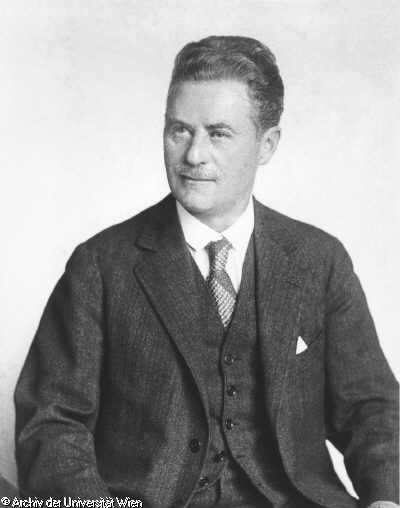Richard Schüller
| Born: |
05-28-1870 |
| Faculty: |
Law School |
| Category: |
Expelled teacher |
Richard SCHUELLER (born on May 28
th, 1870 in Brno, Moravia/Austro-Hungarian Empire [Brno/Czech Republic], died on May 13
th, 1972 in Washington/USA) was honorary professor for national economy at the Law School of the University of Vienna in 1938.
He was persecuted in times of Nazism as a Jew was removed from his post ("on leave of absence until further notice") lost his position and was forced to leave the university on April 8
th, 1938. He was able to emigrate to Italy, later to London/UK and in 1940 to the USA.
Richard Schueller, son of Sigmund Schueller (textile manufacturer) and Erna, née Kohn, studied law at the School of Law and Political Science of the University of Vienna from 1887 and received his academic degree "Dr.jur." in 1892. In 1896 he became vice-secretary of the Lower Austrian Trade Association, and in 1898 ministerial assistant in the Ministry of Trade. In 1899 he published "Die Wirtschaftspolitik der historischen Schule" (The Economic Policy of the Historical School), with which he habilitated at the Law School of the University of Vienna in August 1901.
In 1902 he married Ernestine Rosenthal (1880-1968) in the St. Poelten Temple and they had three daughters: the later economist Ilse Mintz, née Schueller (1904-1978), who emigrated to the USA via Switzerland in 1938, the later historian Susanne Schüller-Piroli, née Schüller (b. 1906), who lived in Italy with her husband since 1936 and the later art historian Hilde Kurz, née Schueller (1910-1981), who emigrated to Great Britain with her husband Otto Kurz in 1937.
Anti-Semitism, already strong at the University of Vienna at the time, prevented the avowed Jew from pursuing a career as a professor, even though he was awarded the title of associate professor in 1910. Richard Schüller remained in the civil service career and in 1913 became a ministerial councilor in the Ministry of Commerce and in 1918 was a member of the delegation for the peace negotiations of Brest-Litovsk and Bucharest and also participated in the peace negotiations of Saint-Germain in 1919. In 1919 he became head of the Trade and Economic Policy Section ("Sektionschef") in the Foreign Ministry and was also influential in financial policy matters. In terms of trade policy, he was favorably disposed toward free trade zones and, in his standard economic work "Schutzzoll und Freihandel" ("Protective Tariffs and Free Trade") (1905), argued that producer and consumer interests should be weighed against each other: Tariffs should hinder cheap foreign imports and protect domestic production, which, however, would burden domestic consumers with higher prices - the benefits and disadvantages of both effects should be weighed and decided according to marginal utility.
He was also a member of the Economic Committee of the League of Nations (1927) and, from 1932, Envoy Extraordinary and Minister Plenipotentiary of the Austrian Government to the League of Nations in Geneva and a central player in Austrian trade policy. Although he was denied a full academic career, he taught at the University of Vienna from 1902-1929 trade and economic policy - from 1910 as titular extraordinary professor and from 1927 as honorary professor. Important functions of his work in Austria were his membership in the
Nationaloekonomische Gesellschaft and his co-editorship of the
Zeitschrift für Nationaloekonomie 1930-1938.
In 1938 Richard Schueller took a leave of absence, but was "retired" under National Socialism and increasingly harassed by the Reichsstatthalterei, which judged him to be a "typical representative of capitalist-masonic tendencies [who] was instrumental in entangling Austria in international debt bondage," and he had to flee from Austria. In November 1938 he was fortunate to emigrate via Italy to his younger daughter in London, England/Great Britain, where he headed the "Europe Study Group" at the "Royal Institute for International Affairs" in 1939-1940 before he was appointed Visting Professor at the "New School for Social Research" in New York, NY, in 1940 and taught there until 1952, meanwhile at the age of 82. In addition, he was active in publishing and consulting (e.g. vice president of Amertrade in 1945 and member of the board of directors of Thonet-Mundus in 1948). Politically, he was active both in England and in the USA, for example as co-founder and chairman of the "Austrian Committee", which supported the war against Nazi Germany and demanded the entry of the USA into the war and the restoration of Austria's independence, but also in Otto Habsburg's "Military Committee for the Liberation of Austria", in the "Free Austrian Movement" and in the "Austrian Institute".
On May 28
th, 1970 he was awarded an honorary doctorate in political science by the University of Vienna.
He died on May 14
th, 1972 in Washington/USA.
Lit.: Archive of the University of Vienna (UA) / enrollment forms ("Nationale") IUR, graduation registry ("Promotionsprotokoll") IUR M 32.3, 662, Senate S 71.5, Senate S 226.35, Senate S 304.1158, personnel roster ("Personalstand") 1937/38, 15; Austrian State Archive (OeStA) / AVA / Education / Univ. Vienna, carton 614, personal records Schueller Richard; STADLER II 2004 [1988], 429-432; Juergen NAUTZ, Unterhaendler des Vertrauens. Aus den nachgelassenen Schriften von Sektionschef Dr. Richard Schueller, Vienna 1990; MUEHLBERGER 1993, 16; BLUMESBERGER 2002, 1232f., 766, 932f.; OLECHOWSKI/EHS/STAUDIGL-CIECHOWIC 2014 , 356-358; 650+|History of the University of Vienna.
Herbert Posch
